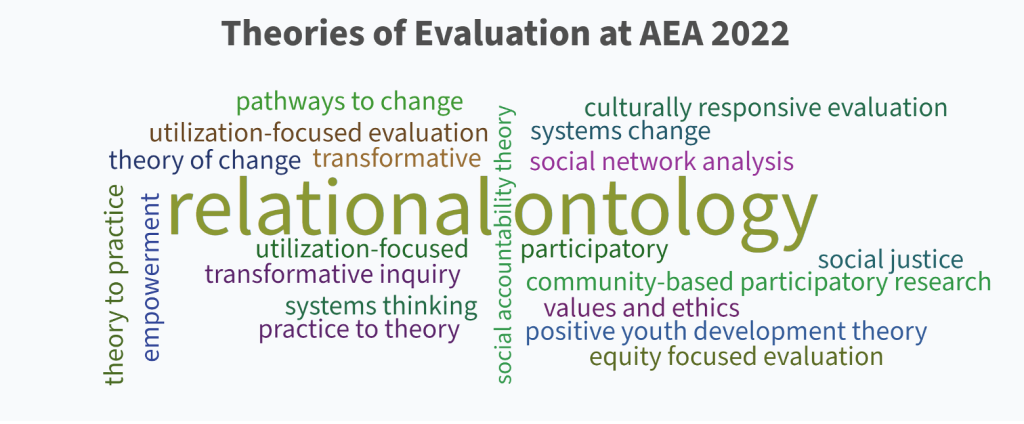Dear friends,
Our names are John LaVelle (UMN) and Jennifer Billman (HACC). We are the co-chairs of the Theories of Evaluation TIG, and it is our pleasure to introduce this week of AEA365 posts on evaluation theory. First, we acknowledge that theory, and what we mean by theory, can be confusing as “theory” can mean quite a few different things depending on how we approach it. To try to capture the various ways we engage theory, the Theories of Evaluation Scavenger Hunt at the conference asked players to identify where and how they encountered theory. Below is a snapshot of some of the ways participants encountered theory.

From this simple game (and a big “thank you” to all who played along), we learned several lessons.
Lesson Learned #1: Evaluation theory is everywhere
This glimpse into the ways theory showed up at AEA 2022 reminds us that evaluation theory is pervasive. Despite the definitional confusion over theory, in practice, evaluators consider approaches, methods, frameworks equal ground for ‘theorizing.’ Indeed, some of the participants in our game identified specific tools (e.g., theory of change), gaps (e.g., theory-to-practice), approaches (e.g., culturally-responsive evaluation), social science theories (e.g., social accountability theory), and values orientations (e.g., social justice). This makes us reflect that even though the term “theory” often means different things to different people, there is value in each of the perspectives offered by these theories. We hope that by making these perspectives more explicit, evaluators can share ideas and learn better from each other and from the communities we serve.
Lesson Learned #2: Evaluation theory is who we are and who we are becoming.
In 1991, Shadish, Cook, and Leviton asked, “What do we mean by theory?” Later in his 1997 AEA Presidential Address, Shadish answered his question, stating that “evaluation theory is who we are” and argued that theory itself is central to our identity as evaluators. He reasoned that theory (a) gives evaluators a language for discussing critical debates, (b) differentiates evaluation from other fields and disciplines, (c) gives evaluators a “face” that we show to the rest of the world, and 4) is the knowledge base that defines the field. Revisiting this speech reminds us that evaluation theories should not be set in stone but should be revisited and updated to help orient us to high quality, ethical, and inclusive practice. With just a glimpse of the ways theory showed up at AEA 2022, we can see that evaluation theory is evolving to help (re)imagine a more inclusive evaluation landscape.
We thank each of our volunteer contributors and are confident their musings on theory and practice will inspire you to engage evaluation theory in a new way as we move into 2023.
The American Evaluation Association is celebrating Theories of Evaluation (ToE) TIG week. The contributions all this week to AEA365 come from AEA’s ToE TIG. Do you have questions, concerns, kudos, or content to extend this AEA365 contribution? Please add them in the comments section for this post on the AEA365 webpage so that we may enrich our community of practice. Would you like to submit an AEA365 Tip? Please send a note of interest to AEA365@eval.org. AEA365 is sponsored by the American Evaluation Association and provides a Tip-a-Day by and for evaluators. The views and opinions expressed on the AEA365 blog are solely those of the original authors and other contributors. These views and opinions do not necessarily represent those of the American Evaluation Association, and/or any/all contributors to this site.
